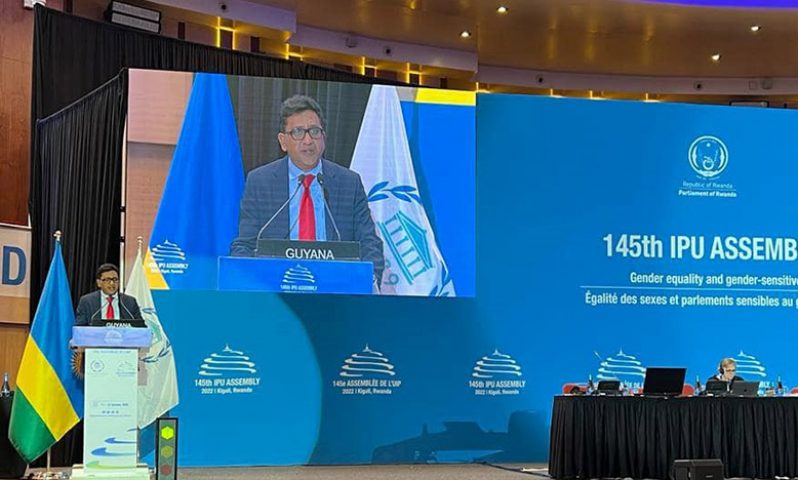–AG Nandlall tells leaders at 145th Inter-Parliamentary Union Assembly in Rwanda
ATTORNEY General and Minister of Legal Affairs, Anil Nandlall, S.C., has said that gender parity in government, the legislature and all other levels of public decision-making is essential to democracy, social advancement, justice and peace.
“Without them, anarchy, violence and despotism result,” Nandlall said in his address to global leaders at the 145th Inter-Parliamentary Union Assembly, Kigali, in Rwanda.
The conference was convened under the theme: “Gender Equality and Gender Sensitive Parliaments as Drivers for a More Resilient and Peaceful World.”
Nandlall assured leaders that the Government of Guyana’s policies are aligned with this theme, and there are continuous efforts to ensure that there is equality and equal treatment across the country.
“It goes without saying that we support the conference’s theme and that the IPU Assembly will have our full backing as it works to advance this admirable goal,” the Attorney General said.
He also made reference to what Dr Martin Luther King, Jr once said: “Peace is not the absence of war but the presence of justice.”
Although gender equality is a fundamental right guaranteed by the United Nations Charter and other governing documents of organizations of a similar nature around the world, and is incorporated into most nations’ constitutions and legislation, Nandlall said: “The reality paints a starkly different picture, in particular as it relates to the membership of parliaments around the world.”
For example, only three out of the 193 countries surveyed have 50 per cent or more women representation in their legislatures; 143 countries have less than 30 per cent of women membership, and, to date, several countries have no women representation in their parliaments.
“These are staggering statistics in a world where the female gender outnumbers the male,” Nandlall remarked.
He related: “Women are the source of life and the reason for our existence. We are all nurtured and groomed by women. It is said that the housewife of the average worker, in a world of rising costs of living but stagnant wages, is the world’s greatest economist. Women have repeatedly shown in almost every area of human endeavour that they are equal to men.”
Quoting President of Rwanda, Paul Kagame, Guyana’s Attorney General said: “We cannot be satisfied when women perform over two-thirds of the world’s work, produce over half of the food we eat, yet just a meagre 10th of global incomes belong to them… “Imihigo” should serve as our new metric for Rwanda’s commitments to better the lives of our girls and women.”
Rwanda, being the nation with the largest proportion of women in parliament (over 60 per cent), has one of the fastest-growing economies, not only on the continent of Africa, but also globally.
Given what Rwanda has accomplished, Nandlall said that there is no justifiable reason to oppose increased gender equality in parliaments, adding that it is unfair to women, and by doing so shortchanges the world and threatens the advancement of humanity as a whole.
It is for this reason that he emphasised the need for much more to be done to engender greater gender parity in parliaments across the world.
Nandlall said too that there needs to be the removal of all institutional and systematic structures, legislation, policies and programmes that perpetuate gender inequality across the states’ apparatus.
The Attorney General noted that Guyana began this process a long time ago, but it remains a work in progress.
He also mentioned that one-third of Guyana’s parliamentarians are women; this is a statutory requirement outlined in the constitution of Guyana.
According to Nandlall, Guyana’s constitution guarantees that every citizen is given equal treatment and protection against discrimination.
Guyana has broad-based commissions established by the constitution, such as the Women and Gender Equality Commission and the Rights of the Child Commission, which are designed to promote issues such as gender parity and to preserve and protect the rights of women and children.
He also highlighted that Guyana has a strong network of legislation, policies and programmes that outlaw gender and other forms of discrimination, and which protect women and children from ills such as sexual abuse, domestic violence and trafficking in persons, as well as human trafficking.
“In short, we are playing our small part and I wish to assure this Assembly that it has a willing partner in Guyana, and I daresay, the entire Caribbean Region.
“Let us therefore resolve to move resolutely to make the theme of this conference a reality. Our failure will certainly result in greater human rights tragedies, societal stagnation and, indeed, the global peace for which we strive will continue to elude us,” Nandlall said.




.jpg)









